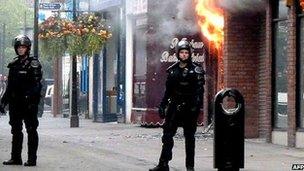Police and crime commissioner elections: Greater Manchester
- Published

More than 100 businesses suffered criminal damage in the 2011 riots
On 15 November, 37 police and crime commissioners will be elected in England along with four in Wales.
The PCCs, as they will be known, will be tasked with scrutinising their force and holding it to account. They will also be able to hire and dismiss the chief constable and set the force's budget.
The commissioners will be paid and are supposed to empower local people into having a say on how crime is tackled in their area.
Nominations for candidates in Greater Manchester have now closed.
BBC News has taken a look at each of the police forces ahead of the elections.
Greater Manchester Police
Greater Manchester Police is the second biggest force in England and Wales, behind London's Metropolitan force, serving more than 2.5 million people over an area of 500 square miles.
The force is split into 12 divisions, covering Bolton, Bury, Metropolitan, North Manchester, Oldham, Rochdale, Salford, South Manchester, Stockport, Tameside, Trafford and Wigan. In addition there is a specialist division based at Manchester International Airport.
Police chiefs have put huge resources into trying to rid the city of gun crime after it was christened "Gunchester" by the media in the mid-1990s.
The gang scene had formed in the 1980s at a time of up to 90% youth unemployment in Manchester's Moss Side. At the height of the "Gunchester" era, 27 people died and 250 people were injured over a five-year period.
Officers started by cracking down on drugs and jailing gang members for drug offences, and in 2004 the force began the dedicated anti-gun crime taskforce Operation Xcalibre.
At the end of 2011 it announced "dramatic reductions" in the number of gang-related shootings. There were 16 shootings that year, compared with 120 five years ago.
But the force still regularly tackles high-profile expensive operations. The riots last year cost the force £8.7m, including overtime payments of £2.3m, and resulted in criminal damage to more than 100 city centre businesses during looting.
Tackling burglary became a top priority after central Manchester topped a Home Office league table of UK break-in "hotspots" in 2009. Operation Storm was started and figures to March 2012 showed the number of domestic burglaries had decreased by 14% with 2,679 fewer victims.
Chief Constable Sir Peter Fahy, who has been in charge of the force since 2008, is also the Association of Chief Police Officers' workforce development lead.
He has hit the headlines on several occasions and earlier this year received a knighthood in the Queen's Birthday Honours List for services to policing.
His tough line on anti-social behaviour and under-age drinking and his outspoken criticism of licensing laws following the murder of Warrington father-of-five Garry Newlove brought Mr Fahy - then Cheshire Chief Constable - to the public's attention in 2007.
However, earlier this year he was criticised by Graham Stringer, Labour MP for Blackley and Broughton, for not being tough enough in his response to the riots.
He was in the news last year when he told officers to ditch red tape and use their common sense instead.
The force works closely with the Association of Greater Manchester Authorities, which is made up of the county's 10 local authorities, to decide on policing priorities for the area.
Funding
The force is in the process of cutting its workforce by almost a quarter after it was announced in the government's Comprehensive Spending Review it must make savings of £134m.
About 3,000 of the force's previously 12,000-strong workforce will be shed by 2015.
However, many of those will be lost through retirement, and a two-year recruitment freeze ended in February with the announcement of 150 new staff to be taken on over the next three years.
So far, savings of £38m were made in 2011-12, and plans are under way to save a further £39m in 2012-13.
Residents have seen no change this year in the amount of their council tax precept going to the police, which is on average £144 for a Band D property.
The precept is lower than neighbouring forces - Merseyside, Cheshire and Lancashire all take about £150 - and Manchester serves almost double the number of people Merseyside does within its boundaries.
Crime and performance
Overall crime in Greater Manchester is currently at its lowest level for 11 years, according to the latest figures.
The amount of recorded crime in the county has dropped by nearly half in the past 10 years, from 383,074 crimes in 2002 to 207,687 in the year to March 2012.
However, one figure on the rise is the number of road deaths, up by 42%, with 75 people killed last year.
Mr Fahy said earlier this year the figure was "absolutely awful" and announced a crackdown on dangerous drivers.
- Published22 August 2012
- Published21 July 2011
- Published19 October 2012
- Published20 July 2012
- Published16 June 2012
- Published2 April 2012
- Published17 March 2012
- Published18 October 2010